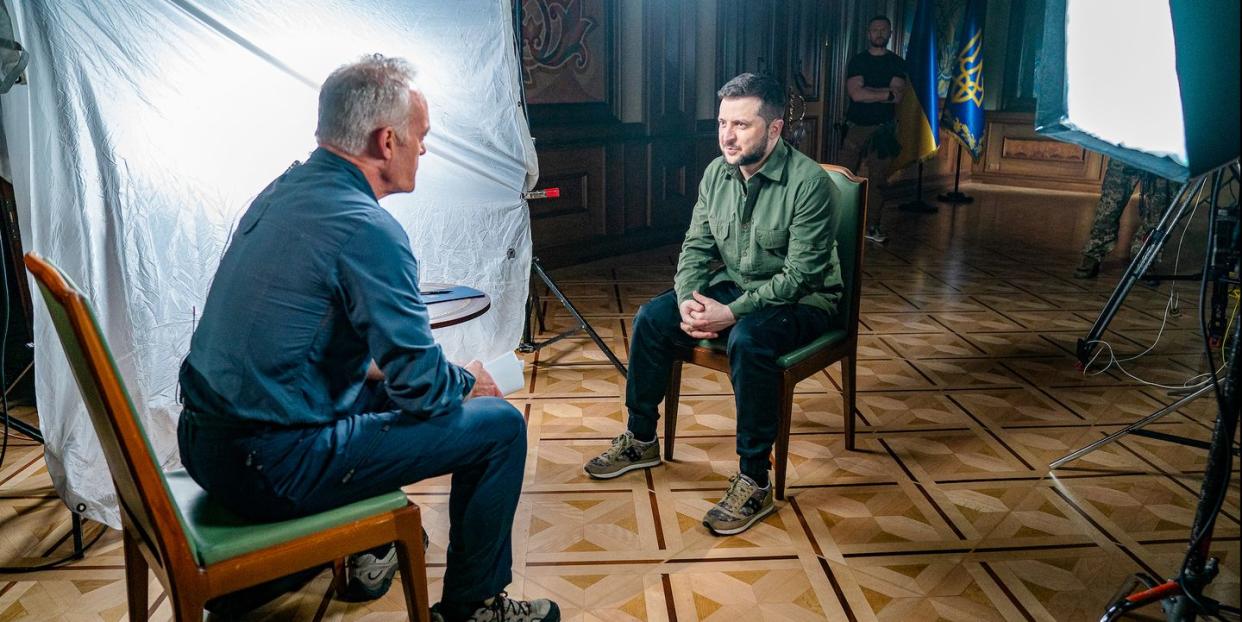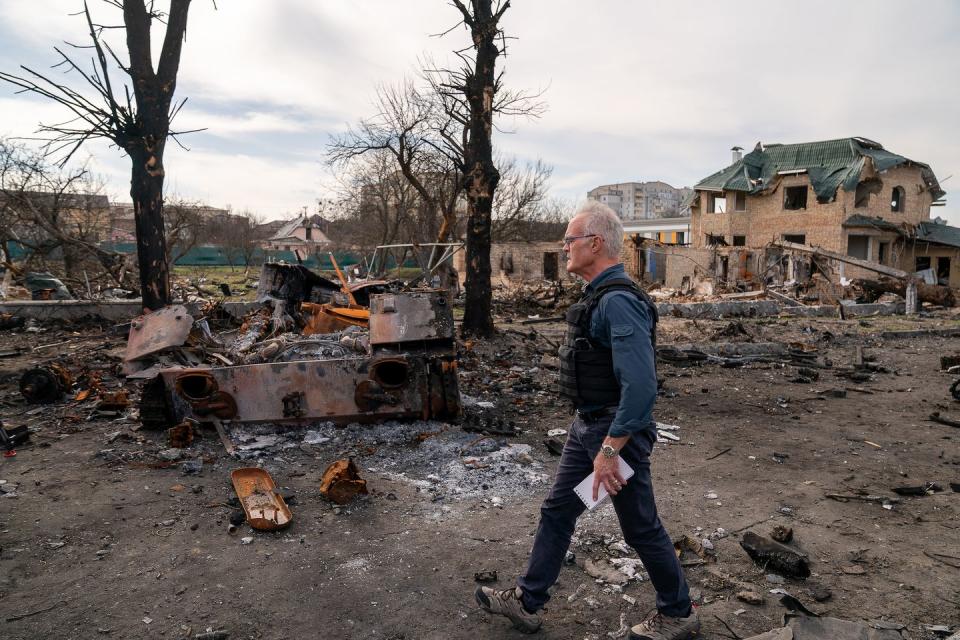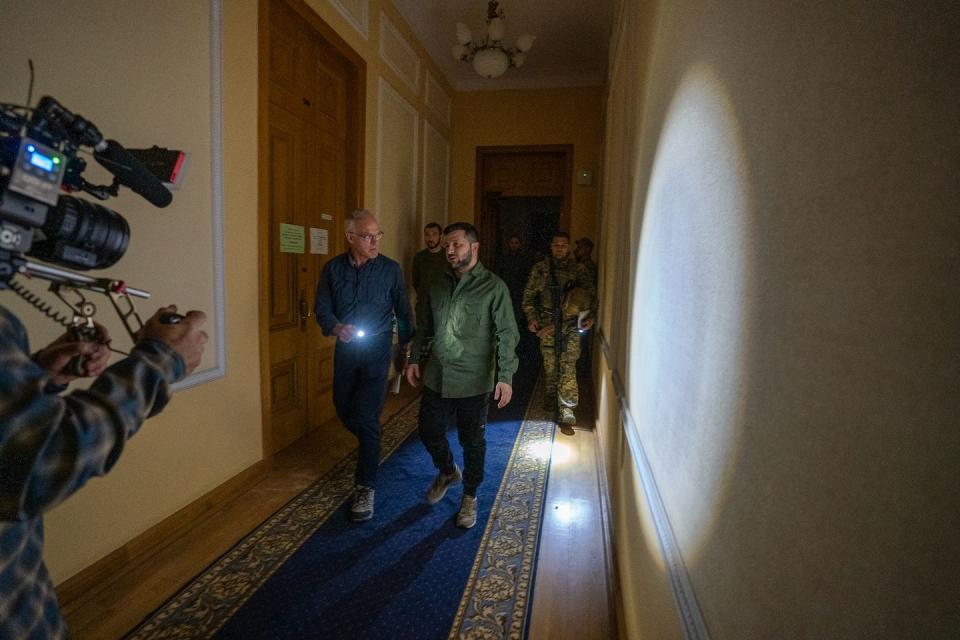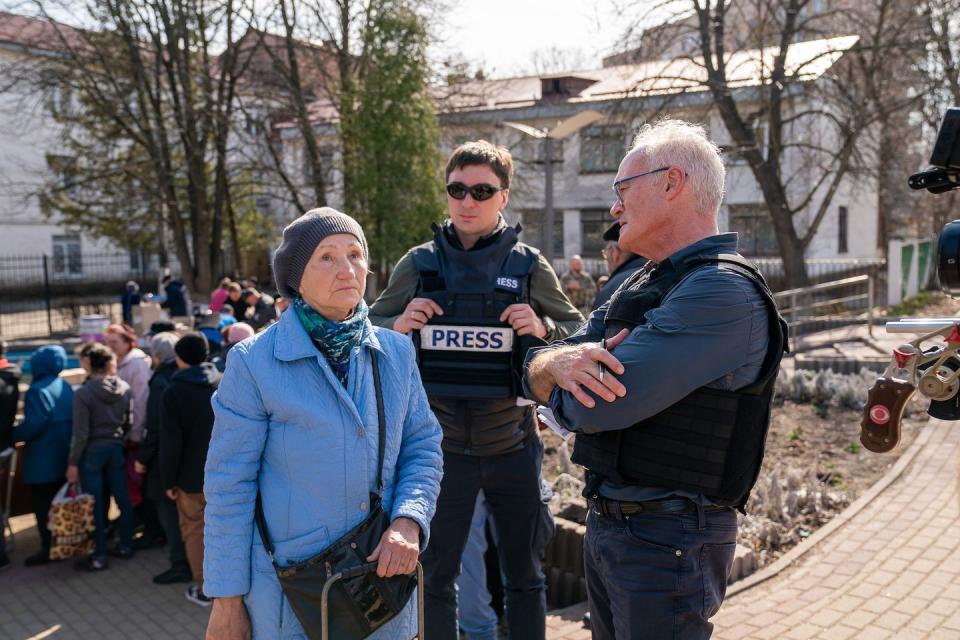Scott Pelley Describes What He Saw in Bucha—and Interviewing Zelensky In Ukraine

- Oops!Something went wrong.Please try again later.
- Oops!Something went wrong.Please try again later.
- Oops!Something went wrong.Please try again later.
Scott Pelley has covered conflicts across the world for decades. But in all that time as a correspondent and anchor at CBS News and 60 Minutes, he says, he has “never seen such wholesale destruction of civilian neighborhoods” as he’s seen from the Russian armed forces in Ukraine. His assessment is unequivocal: “It could only have been done to kill the people.” Talking to residents in the towns of Bucha and Irpin this week, he was told that in one case, a helicopter gunship fired rockets at a 10-story residential building until it collapsed and left “a burned-out shell.” He encountered a mass grave behind an orthodox church, the bodies of women and men left unburied amid the rapid Russian retreat.
When we spoke by phone on Friday, Pelley was nearing the Polish border on his way out of Ukraine. He described the scene on the ground there and what he took from his interview with Ukrainian President Volodymyr Zelensky, whom he spoke with for over an hour in Kyiv this week. Pelley encountered desperation and horror and resilience in the streets and, in a building in the capital, a leader who has stood so improbably against the storied might of the Russian army, long columns marching to take his country away from him and his people. For now, at least, they have been stopped in their tracks. In an interview edited for length and clarity, Pelley offered us a piece of what 60 Minutes has uncovered in Ukraine ahead of a story set to air Sunday at 7 p.m. Eastern on CBS.
Esquire: Did you fly in? What were your first impressions on arriving in Kyiv?
Scott Pelley: Oh no, there's no aviation over Ukraine. There's far too many anti-missile systems, both Ukrainian and Russian. Nobody flies in Ukraine unless it's a fighter jet or a helicopter, a helicopter gunship. I'll just tell you about all the noise behind me. You just caught me, and this is a good time to talk, but you just caught me at the border. I'm in Ukraine, but I just drove 13 hours from Kyiv to get to the border of Poland. And we're going to cross over here in a few minutes.
So when we went to Kyiv, we flew to Romania, we drove to Moldova. We crossed into Ukraine at Moldova, which is way down south. We had a 10-hour drive. It wouldn't normally take that long, but there are roadblocks and checkpoints all along the road, every several miles, defensive positions that have been set up. The Ukrainians are absolutely determined not to let the Russians come through side roads. And so, they've set up big concrete barriers, earthworks in the middle of the road, hedgehogs, those welded together I-beams that can stop a tank. So you have to meander your way through all of that, and it makes the trip longer.

Have you made it closer to the front as well, to other parts of the country?
Well in Kyiv, we went all the way up into the northern suburbs yesterday, including Bucha and Irpin. And I'll tell you, Jack, in 40 years of covering wars, I have never seen such wholesale destruction of civilian neighborhoods, absolutely senseless. It could only have been done to kill the people. There's no military reason for it. 10-story apartment buildings, blown to bits, entire neighborhoods [destroyed]. I was talking to the residents about what happened to a very large 10-story apartment building that was completely a burned out shell. And they said it had been hit by a helicopter gunship that launched rockets into it.
Behind a church, the St. Andrew's Orthodox church, we found a mass grave. The Russians had left and retreated in such haste that they didn't bother to bury the evidence. And so the grave was open, and there were a number of people in the grave, a number of bodies in the grave, all clearly civilian women and men, elderly men, just piled up there, just waiting for mercy, just waiting for someone at some point to lift them out of that trench that they were lying in and properly bury them. Which I'm sure the people of Bucha are all about to do.
On another street in Bucha we found an entire Russian armored column of about six to eight trapped vehicles, just blown to bits, Russian body parts, flying everywhere. No one was in a big hurry to deal with the Russian remains. But clearly, this armored column, incompetently led, found itself on a narrow street with no room to maneuver. And they were bumper to bumper, which you would never do in any kind of a military situation. Ukrainians just worked them over with anti-tank rockets and blew them to smithereens. They were troop carriers. And from the body parts, I really couldn't tell how many had been killed, but the answer is many.
What was so stirring about this trip was that the Ukrainian forces had, at least in this moment in time, had won the battle of Kyiv. Astounding. The Russians sent an enormous invasion force, in from the north, to take the capital city, and therefore take over the government. And they got stopped dead cold in the northern suburbs, and got so decimated by the Ukrainian forces that they had to retreat. And they're all, as I understand it from US intelligence, they're mostly on their way back to Belarus where they came from. They got kicked out of Ukraine. And it's just an amazing story, because the Ukrainians, as you know, were so outgunned and so out-manned. And yet this wonderful, wonderful military and the civilians that joined them were able to prevail over the giant Russian war machine.
Of course, President Zelensky has been a big part of that effort. Did you make contact before you went over to Ukraine?
Well, the whole reason for our trip was to interview President Zelensky. We've been talking to his office for weeks now. And they've always told us, "Come to Kyiv, and we'll sit down with you." And they were good as their word. So we told them we were coming and they said, "We'll be there." And they took us into…I don’t want to describe the building too much. I'm walking through a bunch of traffic here at the border. But they took us into the building where he's lived for the last 46 days and worked, where his staff is, and they're running the war effort. And you go into this building, which is an office building in Kyiv, and it's all blacked out. You can't see the flashlight. And it is piled up high with soldiers, machine guns, mines, explosives, sandbags, everything. Turned it into a fortress. Zelensky explained the lights were out because they're concerned about air strikes. So it's blacked out all the time. Sorry, I’m walking by a bunch of buses.

So we went in. Heavy, heavy security. Went through all of our equipment. That's like 32 cases. And then we set up and waited about three hours. And Zelensky walked in, absolutely buoyant. Here he has the Russian army, trying to kill him and dominate his country, he's got the lives of 44 million people in his hands, and he walks in smiling and shaking hands. Really an amazing ability to withstand the terror and the trauma that his country has been through. And frankly, it was a relieving thing to see. You don't want to see the leader of a country at war downtrodden and worn out. And I think he knows that. He sat with us for an hour and five minutes. I mean, with the President of the United States, I'd get 45 minutes, maybe.
The very refreshing thing about him, Jack, is how plain and honest and undiplomatic he is. In a Zoom meeting with NATO, he called NATO weak and said, "These people are dying because of you." And then the day before our interview, he did a video link with the UN Security Council, and he said, "Where's the security? Maybe if you guys can't stop a war, perhaps you shouldn't exist." And so, he was the same in the interview, very blunt, very frank. And I said, “Mr. President, you're not being very diplomatic." And he said, "Diplomacy is slow. I don't have any more lives to give to diplomacy."
He's a man that I thought of as well-acquainted with gratitude and humility, much more than any politician I've met in the United States, or elsewhere for that matter. A very likable guy.
He’s got the nation’s hopes on his shoulders, but did he talk at all about his personal experience? We’ve heard about the hit squads, and threats to his family.
We talked about the personal experience very much. And the one thing that just fascinates me is that selfie video that he made of the day of the invasion, with his staff, standing out in front of the presidential palace, saying, "Hey, we're all here. We're not going anywhere. Soldiers are here. The citizens are with us, and we're going to be here to the end."
He told us in the interview that if he had left Kyiv, and all of his advisors were telling him to, that if he had left, the country would've fallen apart. And that he knew that if he stood there and risked his own life, then all the other Ukrainians would ask themselves, "How can I do less?" And he said that his goal with that video, he was saying in Kyiv, was to turn the country into an army. And he described Ukraine as a fist now. Because the Russian invasion plan, according to US intelligence, planned on Kyiv falling in three days. They had a worst-case scenario in which Kyiv would hold out for five days. And it seems to me that was entirely predicated on Zelensky running away. He runs away and that armored column that was supposed to come into Kyiv rolls into town. But he didn't. All by himself, he stood there, faced the Russians down. And because he didn't flee, Ukraine didn't fall.

One of the things I write in the story is that leaders don't become legendary very often. You can sort of count them on one hand. And this guy has done that. And now, after at least now winning the battle of Kyiv, the Ukrainians have gone from mere admiration to real credibility. Now when they're asking for weapons, people are taking them very seriously, because they clearly know what they're doing.
At least in one place, they had the Russians on the run, which is not to minimize the fact that it's a catastrophe in the south and in the east. The city of Mariupol, 450,000 people, has just been reduced completely to ruin. And when journalists start getting into those places, the horrors and the atrocities are going to be just about more than we can bear. I'm standing here with probably, just guessing, 250 refugees trying to get across the border all at once. Just to give you a sense of the picture. I’m heading into Poland at the end of our trip. And when I get to the Polish side, just to give you a sense, I will be near the Polish town of Przemyśl.
I’ve got to let you go, but did you get the sense, talking to President Zelensky, that he’s aware of the extraordinary arc that he’s been on, from TV comedian to almost Churchillian figure?
He is aware of it, certainly. I asked him what in his life had prepared him for this moment, because you don't see it in his resumé. And he said, "Nothing in anybody's life prepares them for a moment like this." But he talked about his upbringing. He talked about his parents and all that sort of thing. He's aware of the arc as you call it. But you know, he's very crafty.
This is an arc that he built and designed. He talks in our interview about, in terms of making that selfie video, that announced to the nation that he wouldn't leave. He said that he knew what panic looks like. And he knew he had to turn the entire nation, civilians and military alike, into one fighting force. And that if he left Kyiv, everything would fall apart. He understood that, he said, at that very moment, and was determined to rally the entire country because no one else could.
You Might Also Like

